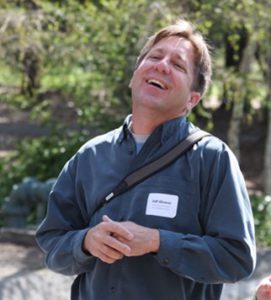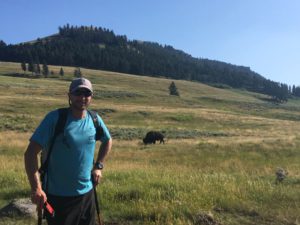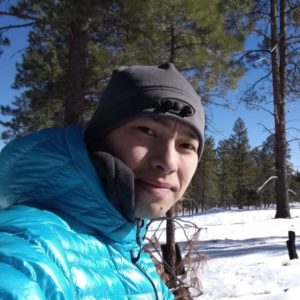2024 Election
This year, there are three candidates for President-Elect:
- Jeff Alvarez
- Hal Holland
- Dr. Ho Yi Wan
Read their candidate statements below, then place your vote via this online ballot

Jeff Alvarez I have been a part of The Wildlife Society since the mid-1980s, sometimes on the periphery and sometimes actively involved. I remember the first time I said I was a wildlife biologist. I was getting a haircut, and the stylist asked what I did (i.e., my job). I heard myself say that I was a wildlife biologist, but immediately felt embarrassed, mostly because I revered the role that wildlife biologists played, and I felt like an imposter. That job title, and ultimately that identity grew on me, and I was, and am, proud of it.
If you know me it may be from the many years of oral or poster presentations I’ve offered, or the workshops that I co-lead with many other great biologists. For those that know me, it may seem like I appreciate the limelight, but in fact I tend to shy away from it. If you are wondering who I may be, I am a practicing herpetologist (but wannabe mammalogist) who has tried to be involved with The Wildlife Society by offering, initially, poster presentations, then oral presentations at nearly every annual Western Section conference for the last 20 years. I may have missed a couple here and there, due to Covid or social anxiety, but I find that as biologists learn things they should share those things, so I do. I’ve also volunteered to be conference chair for many years; helped lead or co-lead workshops that benefit chapters of The Wildlife Society; and offered slots in other workshops to benefit the auction during the Western Section Conference. For some time, I have justified my role on the periphery—I am involved but I don’t have to be fully involved. Over time I have watched some well-respected colleagues be elected as Western Section President, who have done some great work and moved the section forward toward the future in ways that we need. The recent work of presidents who are long term friends has caused me to rethink the role I’d like to play in our section.
I have long voiced a vision for The Western Section that includes a very firm and high valuation of the role of mentoring. I see this as not only an obligation for those of us lucky enough to remain in this field for many years, but as a privilege to pass on what we know. A mentor, in my mind, doesn’t just train a person to do the tasks that they are assigned, but helps them achieve their career goals. This may include getting permitted to work with declining species; knowing how to ask for a raise of pay; navigating tough or spirit-draining projects; and supporting publishing findings, yes, even natural history notes.
I hope to play a role as Section President that meets the high standards of previous Section Presidents, and one that proves that calling oneself a wildlife biologist continues to be something that we all do with pride.

Hal Holland Winter in Yellowstone is way colder than you anticipate. I talked my way into an internship with the wolf relocation program in 1997, and we were searching for winterkill ungulates to evaluate health vs. wolf effects. Being chased by a rogue bison while snowshoeing for dead elk is what brings to focus both the joy of wildlife biology and the hard work it requires to be successful in this profession. Over my career, the hard work has remained, but my purpose has shifted to restoring our natural and wild landscapes, and to develop professional biologists and ecologists to tackle the challenges mounting in our future.
I graduated with a B.S. in Ecology, and started my career as a consultant doing surveys for a wide range of species, such as quino checkerspot butterfly, arroyo toad, Stephens kangaroo rat, Mojave desert tortoise, southwest willow flycatcher, and vernal pool fairy shrimp. My fondest field memories are collecting Sherman traps at dawn to see if we had caught a sensitive species or a wood rat (or worse, a scorpion) to record. I have spent the past 25 years focused on how to protect and preserve habitat for threatened and endangered species. I currently work in large-scale land conservation. As Regional Director, I now oversee the purchase of land for conservation, the securing of regulatory agency support and project approvals, implementation of restoration to regenerate historic conditions, and assurance that the sites bring back the lost natural biologic conditions. I was trained as a biologist, but along the way I’ve had to learn about economics, legal protections, policies and politics, and how to get the public to side with conservation.
Our society and the environment feel like they are at a crossroads. Climate change, 30×30 land protection, green energy, floods, forest fire. How do we navigate this changing physical and political environment as biologists and conservation-minded ecologists? I am submitting my nomination to the Western Section of the Wildlife Society to promote a forum to advance:
- science first in planning and practice;
- advocacy for more planning and implementation of practices that protect our natural resources;
- greater inclusion of the underrepresented and underserved into our profession and our projects; and
- policy engagement for strategic advancement of wildlife conservation and recovery.
The next 10 to 20 years will define the landscape within which our next generation of biologists and citizens exist. We have the opportunity to advocate for research funding, pragmatic conservation solutions, and education and inclusion of the next generation of scientists and wildlife biologists to make a profound difference for our future. I am passionate to help chart that path.

Dr. Ho Yi Wan is an Assistant Professor in the Department of Wildlife at Cal Poly Humboldt, and the director of the Spatial Ecology and Conservation Science Lab. Ho Yi has previously served as the President-Elect, President, and Past-President for the Arizona Chapter of TWS from 2020-2023, and is currently serving as the Conservation Committee Chair for the California North Coast Chapter.
Ho Yi obtained his Ph.D. in Earth Sciences and Environmental Sustainability from Northern Arizona University, and M.S. in Environmental Science from Brigham Young University. He studied wildfire effects on spotted owl habitat for his Ph.D. work before completing a post-doc at University of Montana, investigating connectivity and movement corridors for a number of wildlife species, such as elk, bighorn sheep, black bear, pronghorn, etc.
Ho Yi has established a strong international presence through his research, leading multiple projects across four continents. His current projects include the development of multi-scale spatial statistical methods to understand human-wildlife conflicts and drivers of change on wildlife habitat, connectivity, and gene flow. Ho Yi’s research has led to over 40 peer-reviewed scientific articles since 2014.
As a first-generation immigrant and a person-of-color, Ho Yi empathetically and actively advocates diversity, equity, and inclusion in our field. His lab attracts and trains a diverse body of students who come from an array of backgrounds, and they recently completed a study on gender equity in publishing wildlife science under Ho Yi’s mentorship. If he is elected, Ho Yi’s main vision and focus will be empowering the next generation of scientists and students who are interested in pursuing a career in wildlife management.
